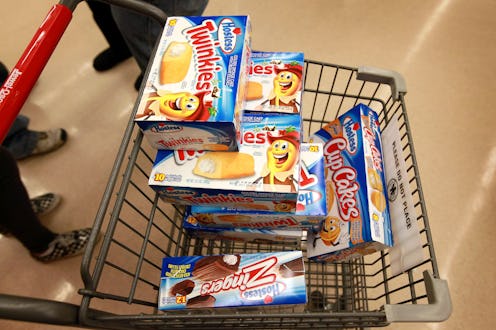News
Junk Food May Be Getting Healthier
Seems like New Year's resolution-makers aren't the only ones obsessed with cutting calories this new year. Major food and beverage companies announced Thursday they have reduced the number of calories in their products by more than 6.4 trillion in an effort to combat obesity. Groups like Coca-Cola, Hershey Co., and Kraft Foods Inc. lowered their numbers, so feel free to make that Velveeta free of guilt.
In a 2010 pledge, 16 companies vowed to cut calories, promising a 1 trillion decrease by 2012 and 1.5 trillion by 2015. The Robert Wood Johnson Foundation spearheaded the project, banding the companies together as part of the Healthy Weight Commitment Foundation. An RWJF evaluation, released Wednesday, found the groups exceeded their top pledge by more than 400 percent.
So what does this mean for foodies? Each person in the United States lessens their daily calorie intake by 78 calories with the cuts, according to the study. One in eight preschoolers is obese, likely carrying on into adulthood, with more than one-third of American adults suffering from obesity. The effort from food and beverage providers continues the steps being taken by fast food companies like Burger King to improve the nation's health.
Researchers at the University of North Carolina analyzed the companies, which all have a big impact on what Americans eat and drink daily (Edy's ice cream, anyone?). The 16 companies created low-calorie alternatives, changed portion sizes, and switched up their advertising to make the change. So while you can still manage to eat an entire pint of slow-churned ice cream on your own, rest-assured there's now a bit less fat in those sweet scoops (or so we're told).
The biggest reduction seen was in households with young children. C. Tracy Orleans, senior scientist at RWJF, says the change brings benefits across the board.
Making the shift from traditional items to lower-calorie ones is not just the right thing for customers, it’s the right thing for these companies’ bottom lines. The next big question is how these changes to what’s available on store shelves actually impact the health of children and families.
Other organizations that made the pledge included Campbell Soup, Nestle USA, Unilever, and Kellogg Co. Surprisingly, some companies that made the switch found record sales and profits increases with the healthy alternatives. America? Healthy? Who knew.
Image: Getty
